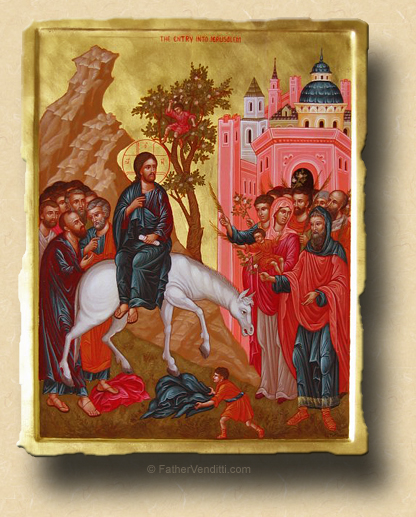Sinning out of weakness vs. sinning because one thinks one knows better.Phil. 4:4-9
John 12:1-18. Flowery Sunday.
Return to ByzantineCatholicPriest.com. |
12:04 PM 4/1/2012 — Last year I opened my homily for Flowery Sunday as I often do: with a historical perspective: when Mary anoints the feet of Jesus, seemingly out of love and devotion, we realize, as does our Lord, that she’s really anointing him in preparation for his burial, even though she doesn’t know this. The Jewish custom was to dress the body with perfumed oils prior to burial; but remember that this could not be done for Jesus after his death because it was the Sabbath and late in the day; that's why Mary, Mary and Salome went to the tomb on the third day: to perform this ritual retroactively, as it were. That makes this anointing in the home of Lazarus significant: because it, in fact, is our Lord's burial anointing, even though he's not yet dead. Then it becomes obvious that the triumphant procession of our Lord into Jerusalem, which we commemorate today, is really a funeral procession, even though no one there at the time knew it except Jesus himself.
From there we discussed how the life of the Church often mirrors the life of our Lord: how, like our Lord, the Church as an institution suffers countless insults and humiliations from those who perceive the Gospel as some sort of imposition on their freedom, as if we're putting guns to people's heads and forcing them to become Christians.  We witness the spectacle of specials on the Discovery Channel and the History Channel attempting to explain away the life of our Lord in rational terms, but without explaining what their vested interest is in trying to drive us away from the faith. What is it about belief in the divinity of Christ that threatens them? They never seem to get around to explaining that. We witness the spectacle of specials on the Discovery Channel and the History Channel attempting to explain away the life of our Lord in rational terms, but without explaining what their vested interest is in trying to drive us away from the faith. What is it about belief in the divinity of Christ that threatens them? They never seem to get around to explaining that.
But, this year, I offer you a different approach: rather than attempting to give a simple pep talk in the face of media persecution, perhaps we can learn something about ourselves.
The spectacle of Holy Week begins, as you know, with a prefiguring of the Resurrection when our Lord brings Lazarus out of his tomb. He enters into Jerusalem in full awareness of why he's there. In the week to come, he allows us to see his humiliation: the insults, the beatings, the flogging, and finally the crucifixion. We see both the cowardice of Judas and the betrayal of Peter, reminding us of the fragile nature of our own dedication to Christ. If these chosen apostles can falter, then so can we; and we know it.
What was it, exactly, that saved Peter from his betrayal, but not Judas? Both were apostles, both were loved by our Lord, both betrayed him; but Peter was able to survive his betrayal with his faith intact. Judas, on the other hand, was so filled with remorse over what he had done that he was driven to take his own life. And the answer might lie in the beginning of today's Gospel, in which Judas displays his vexation over the waste of the perfumed oil. Set aside for a moment the concept of this being our Lord's premature burial ritual. What is the essential difference between Judas' betrayal and Peter's?
Peter's betrayal is one of pure human weakness. He's accused of being associated with Christ; and, because he doesn't want to be arrested himself, he denies it. It's a pure act of self-preservation done in a moment of weakness.
Judas, on the other hand, is not weak at all. His betrayal is grounded in—how does one say it gracefully?—his anal retentiveness. I guess one can't say it gracefully. Things are not perfect enough for him. Jesus has not marketed himself very well; not enough has been said about the Roman occupation of Palestine; Jesus' decision to go to Jerusalem for the Passover was a bad one in his opinion; and now this waste of the apostolic funds on perfumed oil, money which he says, quite correctly, could have been given to the poor, even though we are told by St. John that his motive was a greedy one.
The bottom line is that there's a difference between sinning out of weakness and sinning because one thinks one knows better. It's never a question of commitment to Christ: Peter and Judas were both equally committed to Christ; but Judas had to have it on his own terms. That's why the purpose of amendment in confession is so important. It's not enough to simply know that something I did was wrong; I have to agree that it's wrong; I have to—at the very least—want not to do it again, even if I know there's a strong possibility that I might fail. And if I do fail again, it has to be out of my own weakness, not because I have declared myself right and our Lord wrong.
So, today we begin our long trudge up the mountain of Calvary with our Lord. Like our Lord, we will stumble and fall along the way; and, like our Lord, we will pick ourselves up and dust ourselves off and continue on, just as we do all our lives. The one difference between ourselves and both Peter and Judas is that we know with certainty that, at the end of the road, lies a glorious resurrection.
Father Michael Venditti
|

